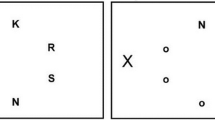Abstract
This paper concerns various competing views on the nature of perceptual justification. Various thought experiments that motivate various views are discussed. Once reliabilism is rejected and some form of internalism is instead embraced, the following issue arises: must an internalist nevertheless require that perceptual justification involve the possession of evidence for the reliability of our perceptual processes? Matthias Steup answers in the affirmative, espousing what he calls internalist reliabilism. Some problems are raised for this form of internalism.
Similar content being viewed by others
Notes
See, e.g., A. Goldman, “What is Justified Belief?”, in G. S. Pappas (ed.), Justification and Knowledge: New Studies in Epistemology (Dordrecht: Reidel, 1979).
See S. Cohen, “Justification and Truth”, Philosophical Studies 46 (1984), 279–95.
I will ignore Putnamian worries about whether such a twin is really possible: one might hold that the difference in environments between me and my “twin” would induce differences in the contents of our mental states, so that my “twin” does not, e.g., have the same beliefs as me.
See “Justification and Truth”, 281.
It has been suggested that there are two distinct epistemic concepts that are lumped under the heading of ‘justification’: an internalist concept that applies to mature humans, and a broader externalist concept that applies to children and higher non-human animals as well as to human sophisticates. It may be that the investigations of this paper, then, concern just the internalist concept.
See M. Steup, “Internalist Reliabilism”, Philosophical Issues 14 (2004), 403–25.
See L. BonJour, “Externalist Theories of Empirical Knowledge”, in P. French, T. E. Uehling, and H. Wettstein (eds.), Midwest Studies in Philosophy V (1980), 53–73. Goldman refined the basic reliabilist analysis he put forward in “What Is Justified Belief?” in his book Epistemology and Cognition (Cambridge: Harvard University Press, 1986). One change he made was designed to handle the BonJour clairvoyant example.
We will discuss what such evidence would look like shortly.
One possibility is to hold that our perceptual beliefs in this demon world have prima facie justification, conferred upon them by their reliability, which justification is defeated by the evidence of unreliability. This view departs from PPR, according to which reliability is sufficient for all-things-considered justification.
Evidence of such local unreliability would preclude my cat-beliefs in the foregoing cases from having justification.
Of course, if I inhabit what is in fact a completely chaotic world, then the right kind of chaotic experience will issue from reliable perceptual processes, and the pertinent beliefs will be true beliefs. Think of the experience of a human space traveler such as that depicted at the end of Stanley Kubrick’s 2001: A Space Odyssey.
An anonymous referee raised the question whether a mental state having complete chaos as its content could count as a memory impression. Following Kant in the Refutation of Idealism, we might well inquire into the conditions that are required for a mental state to represent a past series of temporally ordered events. Such conditions might involve representation of stable, causally ordered sequences of events.
Note that the memory impressions of memorial success might be unveridical, as well as the memory impressions of perceptual success.
On Steup’s view, it is irrelevant whether my perceptual faculties in this imagined world are in fact reliable (due to my inhabiting a crazy world).
Thanks to an anonymous referee for this suggestion.
Thanks to Stewart Cohen, Craig Evans, and three anonymous referees for helpful comments.
Author information
Authors and Affiliations
Corresponding author
Rights and permissions
About this article
Cite this article
Brueckner, A. Internalism and Evidence of Reliability. Philosophia 37, 47–54 (2009). https://doi.org/10.1007/s11406-008-9130-z
Received:
Revised:
Accepted:
Published:
Issue Date:
DOI: https://doi.org/10.1007/s11406-008-9130-z




